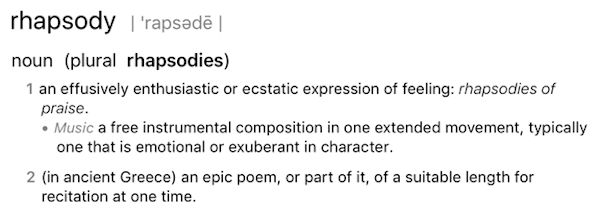
There are words you know and use all the time, but you’ve never thought about their actual dictionary definitions. Rhapsody was one of those words for me. I frequently waxed rhapsodic while describing the first chocolate pecan pie I ever ate. I knew “Rhapsody in Blue” by George Gershwin is the United Airlines corporate theme. So I knew, vaguely, that rhapsody referred to a piece of music or an ecstatic or joyful experience. But I didn’t know what it really meant until I looked it up in preparation for this review, whereupon I discovered that Sarah Chorn’s latest book, Glass Rhapsody, encapsulates all three definitions shown above.

The musical reference is particularly apt, because Chorn isn’t really a writer, she’s a composer. Glass Rhapsody is a stunning final movement of her Weird Western “symphony” set in Shine Territory—a fantasy amalgam of Texas oil fields, Colorado silver mines, and Utah high desert. The first movement, Of Honey and Wildfires (reviewed here), offers a panoramic introduction to the conflict between two of the Territory’s founders: Matthew Esco, owner of the exploitive Shine Company, and Christopher Hobson, the outlaw and saboteur determined to bring down Esco’s empire. The novella Oh That Shotgun Sky (reviewed here) comprises the second movement and explores the immediate aftermath of the first book’s events and how they change the lives of Shine Territory residents. Set five years afterward and centered on the effort to rebuild the Territory as an independent nation, Glass Rhapsody draws upon the themes of the other books. The first novel is a dirge with turbulent moments, the second a hopeful bridge between first and third movements (i.e., books). The third part of the series reprises the mournful tone of the first but then incorporates the nascent optimism of the second as it builds to a finale that suggests the troubled souls of Shine Territory may yet find some joy.

Effusive expression of feeling is a hallmark of Chorn’s writing and what stokes her fans’ enthusiasm. Glass Rhapsody offers readers the broadest emotional landscape of the series and was, for me, the most moving—particularly Elroy’s story. A Shine company man, Elroy participates in a massacre at the climax of Of Honey and Wildfires. Five years later, Elroy returns to the Territory for treatment at a hospital for shine addicts (known as burnouts). Shine is a magical substance that does it all, from making food taste better, to ameliorating pain and healing injuries, to powering industry, communications, and weaponry. It’s also extremely addictive and causes wild and intense hallucinations, like a combination of heroin and LSD.
Elroy was shot with a shine gun and is now a burnout, leaving him a hollow and haunted man. But it would seem that not all the visions brought by shine are delusions. Among its properties, the most magical aspect of shine is it seems to be a conduit to the dead—spiritualism in a bottle—and the ghosts who haunt burnouts like Elroy might just be real. This ability to commune with spirits is central to Elroy’s redemption. Once a cause of suffering within the territory, Elroy’s ability to speak to and for the dead helps heal deep wounds and mend broken hearts.
Also returning from Honey and Wildfires are Cassandra, a woman burdened by an unassuageable grief, and Arlen, heir to the Shine Company fortune. Arlen tries desperately to help Cassandra emerge from despair while also redressing the damage done by Matthew’s oppressive and exploitive business practices. Arlen’s compassion runs deep, but it’s not enough to counter the settlers’ resentment or Cassandra’s depression. As she sinks deeper into mourning, the Territory’s problems grow bigger. Every day more settlers arrive from the Union (a fantasy version of the 1800s United States), and the Union government has its eye on shine. Grace, a former prostitute who appeared in Oh, That Shotgun Sky, has a taste of Union-made trouble and goes to find out what Arlen’s going to do about it. Arlen, who came to the Territory so full of hope and excitement, fears now he’s in over his head. Chorn deftly weaves all these plot threads into her emotional landscape, keeping the reader turning the pages and anxious for everyone to be okay in the end.

The resolution to the Territory’s problems comes suddenly, without warning, like the deus ex machina of ancient Greek literature. The event involves a policy change that could not have happened overnight, so the settlers’ surprise seems unlikely. However, I suspect the miraculous aspect of the conclusion was Chorn’s deliberate choice because she is so meticulous with her craft. She also researches every aspect of her work. My favorite thing about this series is how it captures the late Nineteenth Century, from the morals and morays, the way people speak, and the things they believe. It’s a world of outlaws and lawmen, robber barons and whores, prim lady trailblazers and downtrodden child laborers. And I absolutely love the concept of shine as a functional snake oil. It takes the huckster’s promise and makes it real. And that is exactly what a novel—particularly a fantasy novel—is supposed to do.

